Mirex
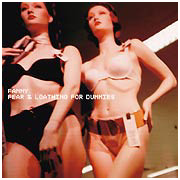 There must be something strange in Winnipeg's water. Or maybe not...maybe it's just a case of Fanny having a serious case ofVenetian-Snares-idol-worship. Whatever the case may be, Fanny sounds alot like Venetian Snares. If you're familiar with Venetian Snares'music, that sentence essentially pre-empts the rest of this review foryou. However, to Fanny's credit, he (for the most part) isn't asneedlessly "experimental" (for want of a better term) as the Snares manis. Regardless, I don't find myself enjoying this disc much. First andforemost, however, it's a style issue - this breakcore just isn't mykind of breakcore. Technically Fanny fares quite well, chopping upbreakbeats and samples and mixing it all together. But I just can't getinto it. Give me a DJ Scud record and I'll be swaying and doing my bestragga-rudeboy impression, but Fanny leaves me somewhat entertained, butnot marveled or enchanted. Despite some clever tracks ("Artists orAnarchists") this album left a strange taste in my mouth - likemarshmallows without sugar, or something. But if you're into the"Winnipeg" style of breakcore (I guess it's turning into its own genrenow) - give this disc a try at least.
There must be something strange in Winnipeg's water. Or maybe not...maybe it's just a case of Fanny having a serious case ofVenetian-Snares-idol-worship. Whatever the case may be, Fanny sounds alot like Venetian Snares. If you're familiar with Venetian Snares'music, that sentence essentially pre-empts the rest of this review foryou. However, to Fanny's credit, he (for the most part) isn't asneedlessly "experimental" (for want of a better term) as the Snares manis. Regardless, I don't find myself enjoying this disc much. First andforemost, however, it's a style issue - this breakcore just isn't mykind of breakcore. Technically Fanny fares quite well, chopping upbreakbeats and samples and mixing it all together. But I just can't getinto it. Give me a DJ Scud record and I'll be swaying and doing my bestragga-rudeboy impression, but Fanny leaves me somewhat entertained, butnot marveled or enchanted. Despite some clever tracks ("Artists orAnarchists") this album left a strange taste in my mouth - likemarshmallows without sugar, or something. But if you're into the"Winnipeg" style of breakcore (I guess it's turning into its own genrenow) - give this disc a try at least.
 There must be something strange in Winnipeg's water. Or maybe not...maybe it's just a case of Fanny having a serious case ofVenetian-Snares-idol-worship. Whatever the case may be, Fanny sounds alot like Venetian Snares. If you're familiar with Venetian Snares'music, that sentence essentially pre-empts the rest of this review foryou. However, to Fanny's credit, he (for the most part) isn't asneedlessly "experimental" (for want of a better term) as the Snares manis. Regardless, I don't find myself enjoying this disc much. First andforemost, however, it's a style issue - this breakcore just isn't mykind of breakcore. Technically Fanny fares quite well, chopping upbreakbeats and samples and mixing it all together. But I just can't getinto it. Give me a DJ Scud record and I'll be swaying and doing my bestragga-rudeboy impression, but Fanny leaves me somewhat entertained, butnot marveled or enchanted. Despite some clever tracks ("Artists orAnarchists") this album left a strange taste in my mouth - likemarshmallows without sugar, or something. But if you're into the"Winnipeg" style of breakcore (I guess it's turning into its own genrenow) - give this disc a try at least.
There must be something strange in Winnipeg's water. Or maybe not...maybe it's just a case of Fanny having a serious case ofVenetian-Snares-idol-worship. Whatever the case may be, Fanny sounds alot like Venetian Snares. If you're familiar with Venetian Snares'music, that sentence essentially pre-empts the rest of this review foryou. However, to Fanny's credit, he (for the most part) isn't asneedlessly "experimental" (for want of a better term) as the Snares manis. Regardless, I don't find myself enjoying this disc much. First andforemost, however, it's a style issue - this breakcore just isn't mykind of breakcore. Technically Fanny fares quite well, chopping upbreakbeats and samples and mixing it all together. But I just can't getinto it. Give me a DJ Scud record and I'll be swaying and doing my bestragga-rudeboy impression, but Fanny leaves me somewhat entertained, butnot marveled or enchanted. Despite some clever tracks ("Artists orAnarchists") this album left a strange taste in my mouth - likemarshmallows without sugar, or something. But if you're into the"Winnipeg" style of breakcore (I guess it's turning into its own genrenow) - give this disc a try at least.
samples:


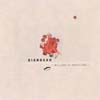 It's almost too good to be true. Dianogah, one of the finestinstrumental math rock groups around, enter the studio to recordanother full-length, this time with John McEntire turning the knobs.You can't ask for a better recipe than that. And the results? Yes,"Millions of Brazillians is the best Dianogah release yet, for a numberof reasons. First, McEntire, unlike Steve Albini on their last release,"Battle Champions," didn't just let them rest on their laurels andpress record in the control room. As the liner notes say: "Recorded,Mixed, and Embiggened" were McEntire's credits, and it shows. Second,the songs are more expansive, accomplished, and crisper sounding. Theband seems more aggressive and confident. The guest musicians, notoften seen on Dianogah releases (they used to have Team Dianogahreleases specifically to separate work with guest musicians from theirreleases), add flourishes here and there that are worthy additions tothe sound. 'The Smallest Chilean' is the darkest Dianogah yet, pushingFor Carnation territory. 'Flat Panda' is among their most melodic work,reminiscent of their contribution to the "Reach the Rock" soundtrack.In fact, despite the strange titles ('Goto Dengo Loses the War'?), thismusic is all very driven, almost sensual. And, lastly, for the firsttime, no vocals appear anywhere on this release. Not that the vocalswere ever THAT bad, but it's great to hear a whole Dianogah CD withoutany really awkward moments, which the vocals always seemed to be. Checkout the sound samples and I bet you'll agree: Dianogah can only getbetter.
It's almost too good to be true. Dianogah, one of the finestinstrumental math rock groups around, enter the studio to recordanother full-length, this time with John McEntire turning the knobs.You can't ask for a better recipe than that. And the results? Yes,"Millions of Brazillians is the best Dianogah release yet, for a numberof reasons. First, McEntire, unlike Steve Albini on their last release,"Battle Champions," didn't just let them rest on their laurels andpress record in the control room. As the liner notes say: "Recorded,Mixed, and Embiggened" were McEntire's credits, and it shows. Second,the songs are more expansive, accomplished, and crisper sounding. Theband seems more aggressive and confident. The guest musicians, notoften seen on Dianogah releases (they used to have Team Dianogahreleases specifically to separate work with guest musicians from theirreleases), add flourishes here and there that are worthy additions tothe sound. 'The Smallest Chilean' is the darkest Dianogah yet, pushingFor Carnation territory. 'Flat Panda' is among their most melodic work,reminiscent of their contribution to the "Reach the Rock" soundtrack.In fact, despite the strange titles ('Goto Dengo Loses the War'?), thismusic is all very driven, almost sensual. And, lastly, for the firsttime, no vocals appear anywhere on this release. Not that the vocalswere ever THAT bad, but it's great to hear a whole Dianogah CD withoutany really awkward moments, which the vocals always seemed to be. Checkout the sound samples and I bet you'll agree: Dianogah can only getbetter.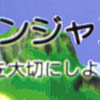 I was mesmerized the first time I saw Maria Moran, otherwise known asZipperspy, play at a gig opening for Zbigniew Karkowski, whom she blewout of the water with a commanding and enigmatic performance. Armedwith her laptop, Moran unleashed a fury of aggressive distortion andpulse-pounding beats. Upon learning a few months later of her newalbum, 'Glass Bomb Baby', by Darla sub-label Fuzzy Box, I was eager toget my hands on it as soon as possible. Sadly, I discovered that herrecord does not fully live up to the strength of her live act. Thealbum is a patchwork of convulsive gabber loops, electronic twitchesand twitters, vocal fragments, and eerie bits of instrumentation. Thetracks themselves are usually two minutes long or less, and seem to bepieces Moran has culled from various sources, such as live performancesand "phone machine in Oakland" (?). 'Glass Bomb Baby', despite beingunspectacular, is by no means dismissable. Moran's integrity and hardwork are evident. Perhaps Zipperspy just has to been seen to bebelieved.
I was mesmerized the first time I saw Maria Moran, otherwise known asZipperspy, play at a gig opening for Zbigniew Karkowski, whom she blewout of the water with a commanding and enigmatic performance. Armedwith her laptop, Moran unleashed a fury of aggressive distortion andpulse-pounding beats. Upon learning a few months later of her newalbum, 'Glass Bomb Baby', by Darla sub-label Fuzzy Box, I was eager toget my hands on it as soon as possible. Sadly, I discovered that herrecord does not fully live up to the strength of her live act. Thealbum is a patchwork of convulsive gabber loops, electronic twitchesand twitters, vocal fragments, and eerie bits of instrumentation. Thetracks themselves are usually two minutes long or less, and seem to bepieces Moran has culled from various sources, such as live performancesand "phone machine in Oakland" (?). 'Glass Bomb Baby', despite beingunspectacular, is by no means dismissable. Moran's integrity and hardwork are evident. Perhaps Zipperspy just has to been seen to bebelieved.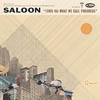 Reading, UK quintet Saloon emerge with their debut full-length album,following a steady stream of 7" singles over the past four years.Produced with assistance from multi-talented Mahogany frontman AndrewPrinz (who also was responsible for the album's eye-catching artwork),'(This Is) What We Call Progress' is ten songs of gently ebbingguitars, a smattering of synths, warm viola, exotic hints of melodicaand glockenspiel, and sweet female vocals. Saloon has a lot of goodideas and obviously are a gifted group of musicians (not to mentionhave a sense of humor with song titles like "Girls Are the New Boys"and "My Everyday Silver Is Plastic"), but their debut is somehowlacking the punch to really make them stand out from the crowd. Thatsaid, 'Progress' has those promising moments that lead me to believeperhaps the band has the potential to do this. "2500 Walden Avenue" isa dreamy, moody ballad that captures Saloon at their most creative."Girls Are the New Boys" exhibits their versatility and dynamism.Sadly, though, the high points just don't equal consistency. 'Progress'is charming and will likely please fans of rock in the vein of acertain farfisa-driven group, but is not a must-have.
Reading, UK quintet Saloon emerge with their debut full-length album,following a steady stream of 7" singles over the past four years.Produced with assistance from multi-talented Mahogany frontman AndrewPrinz (who also was responsible for the album's eye-catching artwork),'(This Is) What We Call Progress' is ten songs of gently ebbingguitars, a smattering of synths, warm viola, exotic hints of melodicaand glockenspiel, and sweet female vocals. Saloon has a lot of goodideas and obviously are a gifted group of musicians (not to mentionhave a sense of humor with song titles like "Girls Are the New Boys"and "My Everyday Silver Is Plastic"), but their debut is somehowlacking the punch to really make them stand out from the crowd. Thatsaid, 'Progress' has those promising moments that lead me to believeperhaps the band has the potential to do this. "2500 Walden Avenue" isa dreamy, moody ballad that captures Saloon at their most creative."Girls Are the New Boys" exhibits their versatility and dynamism.Sadly, though, the high points just don't equal consistency. 'Progress'is charming and will likely please fans of rock in the vein of acertain farfisa-driven group, but is not a must-have.  I have to preface this review by telling how I first discovered ToddGautreau's music back in my college radio days. I worked the overnightshift playing industrial and experimental music to the drunk and/orstudious kids at Boston University. Alone in the studio at 1AM,browsing the shelves for new music becomes a weekly activity. It washere that I found a dark ambient album (though nothing as grim as theCold Meat Industry I used to play) by a project called Tear Ceremony. Ireally enjoyed 'Film Decay' because it was different from so much ofwhat I was used to listening to. Later, however, we received a CD byanother project of Gautreau's named Sonogram. 'Heartbeat Submarines'was an impressive work, overflowing with positive vibes and ultra-warmsynth tones (such as on the excellent "Dresden Girls" and "ConcaveHeart"). Having said all that, the arrival (weak pun intended) of thisnew Sonogram CD in my mailbox was a welcome surprise. The same feelingsevoked from the prior album are present here on 'Arrival Lounge,'accompanied this time by more prominent yet still rather light beatstructures. The title track opens the album with a piano line similarto Radiohead's "Everything In It's Right Place," but instead of beingglitchy and bizarre, morphs into a smooth jazzy ambient piece. The pacestays relatively downtempo for the bulk of the album, increasing inpace occasionally like on "Portal", a drum n' bass track stuffed withSonogram's signature noodly synths. Some other highlights here includethe deep house groove of "Pixel Dust" and Moog-like textures of"Hummer." Though Gautreau seems to release exclusively throughSimulacra, I could easily see songs like "Dramamine" appear on somehigh-profile experimental labels out there, despite the ever-presentpop sentiments. In a day and age where Brazilian rhythms and rehashedbossa nova classics are appropriated by well-dressed Austrian DJs formartini swilling crowds in jet-set lounges (boy do I wish I was in oneof those right now), Sonogram gives a welcome alternative for thelaptop set desperately needing a break from all of Squarepusher noiseand Kid606 mashups.
I have to preface this review by telling how I first discovered ToddGautreau's music back in my college radio days. I worked the overnightshift playing industrial and experimental music to the drunk and/orstudious kids at Boston University. Alone in the studio at 1AM,browsing the shelves for new music becomes a weekly activity. It washere that I found a dark ambient album (though nothing as grim as theCold Meat Industry I used to play) by a project called Tear Ceremony. Ireally enjoyed 'Film Decay' because it was different from so much ofwhat I was used to listening to. Later, however, we received a CD byanother project of Gautreau's named Sonogram. 'Heartbeat Submarines'was an impressive work, overflowing with positive vibes and ultra-warmsynth tones (such as on the excellent "Dresden Girls" and "ConcaveHeart"). Having said all that, the arrival (weak pun intended) of thisnew Sonogram CD in my mailbox was a welcome surprise. The same feelingsevoked from the prior album are present here on 'Arrival Lounge,'accompanied this time by more prominent yet still rather light beatstructures. The title track opens the album with a piano line similarto Radiohead's "Everything In It's Right Place," but instead of beingglitchy and bizarre, morphs into a smooth jazzy ambient piece. The pacestays relatively downtempo for the bulk of the album, increasing inpace occasionally like on "Portal", a drum n' bass track stuffed withSonogram's signature noodly synths. Some other highlights here includethe deep house groove of "Pixel Dust" and Moog-like textures of"Hummer." Though Gautreau seems to release exclusively throughSimulacra, I could easily see songs like "Dramamine" appear on somehigh-profile experimental labels out there, despite the ever-presentpop sentiments. In a day and age where Brazilian rhythms and rehashedbossa nova classics are appropriated by well-dressed Austrian DJs formartini swilling crowds in jet-set lounges (boy do I wish I was in oneof those right now), Sonogram gives a welcome alternative for thelaptop set desperately needing a break from all of Squarepusher noiseand Kid606 mashups. A good cover of someone else's song is often a tricky thing. You haveto capture the essence of the song without doing an exact copy of theoriginal. You have to find the right elements to make it your ownwithout damaging the integrity of the basis for your tribute. This iswhy most tribute records these days fail miserably. "Reservoir Songs,"the newest release from Crooked Fingers, does not fail in this regard.This five song EP is probably the best collection of covers I've heard,mainly because of Eric Bachmann's unflinching interpretation of thesesongs. Due to the nature of his sound with Crooked Fingers - muchfolkier and downtrodden than any of his work with Archers of Loaf -these covers are very sparse, with few instruments being used, thusgiving everything a poor boy beauty. This is also the first time on aCrooked Fingers release that Bachmann's regular touring ensemble joinshim in the studio. The songs sound like they were recorded live totape, with little over-dubbing, which also leads to a natural sound,warts and all. And his choice of covers? Not surprising, for the mostpart, considering Bachmann's work in this band. There's a KrisKristofferson cover, a Johnny Cash cover, and, since there are manycomparisons drawn between their voices, a Springsteen cover. It's thelast two that tweak the head a little on first listen. Crooked Fingersdoing 'When U Were Mine' by Prince? Fantastic harmonies, and basing thewhole thing around banjo make for a smooth ride. 'Under Pressure' byQueen/David Bowie? Luckily, Bachmann stays in the Bowie vain anddoesn't try for the Freddy Mercury notes. Bachmann has said in recentinterviews that he would like to release more covers EPs periodically,making a series out of them. In that case, I look forward to the nextone, as Bachmann truly has the essence right.
A good cover of someone else's song is often a tricky thing. You haveto capture the essence of the song without doing an exact copy of theoriginal. You have to find the right elements to make it your ownwithout damaging the integrity of the basis for your tribute. This iswhy most tribute records these days fail miserably. "Reservoir Songs,"the newest release from Crooked Fingers, does not fail in this regard.This five song EP is probably the best collection of covers I've heard,mainly because of Eric Bachmann's unflinching interpretation of thesesongs. Due to the nature of his sound with Crooked Fingers - muchfolkier and downtrodden than any of his work with Archers of Loaf -these covers are very sparse, with few instruments being used, thusgiving everything a poor boy beauty. This is also the first time on aCrooked Fingers release that Bachmann's regular touring ensemble joinshim in the studio. The songs sound like they were recorded live totape, with little over-dubbing, which also leads to a natural sound,warts and all. And his choice of covers? Not surprising, for the mostpart, considering Bachmann's work in this band. There's a KrisKristofferson cover, a Johnny Cash cover, and, since there are manycomparisons drawn between their voices, a Springsteen cover. It's thelast two that tweak the head a little on first listen. Crooked Fingersdoing 'When U Were Mine' by Prince? Fantastic harmonies, and basing thewhole thing around banjo make for a smooth ride. 'Under Pressure' byQueen/David Bowie? Luckily, Bachmann stays in the Bowie vain anddoesn't try for the Freddy Mercury notes. Bachmann has said in recentinterviews that he would like to release more covers EPs periodically,making a series out of them. In that case, I look forward to the nextone, as Bachmann truly has the essence right.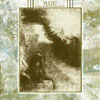 I sure do love it when an album which you have high expectations ofmeets and exceeds those expectations. Such is the case with the latest(and apparently final) offering from Heid, a Swedish dark ambient groupwhose hard-to-find debut and sophomore disc on Malignant provedthemselves a group of talented fellows. This album serves as a sort ofa "best-of," I always find it hard to appropriately describe darkambient music without lapsing into a mindless jumble of adjectives...but I have to say that 'Pilgrim' is wonderfully liquid and floaty.Despite the fact that some (or all? Not having heard the first album, Icannot say for sure) of the material here is culled from earlierreleases, the re-mixing and re-working of the tracks make them soundsplendid together and makes it sound like an individual album, ratherthan a compilation of previous pieces. Heid's members have now gonetheir separate ways (the death of one project resulted in the birth oftwo just as great, Survival Unit and L.E.A.K.) but this CD is a fittingepitaph to their work, though I do wish it had included new material toboot. The album works so well as a whole, though, that it all soundspretty much new to me, and should be sitting on top of my'CMI-dark-ambient list' for a while to come.
I sure do love it when an album which you have high expectations ofmeets and exceeds those expectations. Such is the case with the latest(and apparently final) offering from Heid, a Swedish dark ambient groupwhose hard-to-find debut and sophomore disc on Malignant provedthemselves a group of talented fellows. This album serves as a sort ofa "best-of," I always find it hard to appropriately describe darkambient music without lapsing into a mindless jumble of adjectives...but I have to say that 'Pilgrim' is wonderfully liquid and floaty.Despite the fact that some (or all? Not having heard the first album, Icannot say for sure) of the material here is culled from earlierreleases, the re-mixing and re-working of the tracks make them soundsplendid together and makes it sound like an individual album, ratherthan a compilation of previous pieces. Heid's members have now gonetheir separate ways (the death of one project resulted in the birth oftwo just as great, Survival Unit and L.E.A.K.) but this CD is a fittingepitaph to their work, though I do wish it had included new material toboot. The album works so well as a whole, though, that it all soundspretty much new to me, and should be sitting on top of my'CMI-dark-ambient list' for a while to come.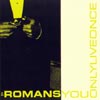 Some will remember the Romans as a supergroup of sorts, comprised of members of LA's more aggressively strange bands Monitor, Human Hands, and the Los Angeles Free Music Society, among others. Whereas some of the members' previous bands were intellectual and confrontational art-punk, the Romans' music is much more straightforward and fun.
Some will remember the Romans as a supergroup of sorts, comprised of members of LA's more aggressively strange bands Monitor, Human Hands, and the Los Angeles Free Music Society, among others. Whereas some of the members' previous bands were intellectual and confrontational art-punk, the Romans' music is much more straightforward and fun.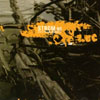 The second disc for this Finnish industrial/power-electronics act proves to be by far their strongest work yet. After a short stint of consuming as much power electronics/noise as I could, I sort of lost touch with it and have since not enjoyed it as much as I used to, save for some classic acts - one of whom is STROM.ec.
The second disc for this Finnish industrial/power-electronics act proves to be by far their strongest work yet. After a short stint of consuming as much power electronics/noise as I could, I sort of lost touch with it and have since not enjoyed it as much as I used to, save for some classic acts - one of whom is STROM.ec.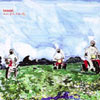 Someone please take the vocoder away from Knodel. Like a joke that'skind of funny the first time and stops being funny soon after, Knodel'sTrans-Am-meets-They-Might-Be-Giants 80s-metal/synth-rock is cornywithout being very clever. Numerous references to "Knodel" - Knodellikes to rock, Knodel unchained, Don't fear for Knodel, It's a Knodelworld, etc - are probably hilarious to the members of the band, but inme they illicit the rolling of the eyes. The vocals don't help - whenthey're not vocoded (and they're vocoded a LOT) the two voices soundlike a duet between TMBG's John Linnell and the falsetto from "The LionSleeps Tonight." The choices in keyboard sounds leaves a lot to bedesired, too. Granted, there are a few moments on the disc that mightmake you think, "OK, Knodel's not THAT bad," but these moments are fewand far-between. The best moment on the entire album is the first 45seconds of the opening title track, and it's all downhill from there.It's not that I don't like music that has a sense of humor - I reallydo, and I even appreciate the cover of 80s cheese-metal group Manowar's"Kingdom Come" - but the music has got to be worthwhile at the sametime. I guess I should give Knodel credit for the fact that they'vebeen making retro synth rock for four years or so (since before it wasso dang hip), but do we really need another band ironically singing,"We wanna rock, we wanna rock you now"? Doesn't the joke ever get old?Apparently to Knodel, it doesn't.
Someone please take the vocoder away from Knodel. Like a joke that'skind of funny the first time and stops being funny soon after, Knodel'sTrans-Am-meets-They-Might-Be-Giants 80s-metal/synth-rock is cornywithout being very clever. Numerous references to "Knodel" - Knodellikes to rock, Knodel unchained, Don't fear for Knodel, It's a Knodelworld, etc - are probably hilarious to the members of the band, but inme they illicit the rolling of the eyes. The vocals don't help - whenthey're not vocoded (and they're vocoded a LOT) the two voices soundlike a duet between TMBG's John Linnell and the falsetto from "The LionSleeps Tonight." The choices in keyboard sounds leaves a lot to bedesired, too. Granted, there are a few moments on the disc that mightmake you think, "OK, Knodel's not THAT bad," but these moments are fewand far-between. The best moment on the entire album is the first 45seconds of the opening title track, and it's all downhill from there.It's not that I don't like music that has a sense of humor - I reallydo, and I even appreciate the cover of 80s cheese-metal group Manowar's"Kingdom Come" - but the music has got to be worthwhile at the sametime. I guess I should give Knodel credit for the fact that they'vebeen making retro synth rock for four years or so (since before it wasso dang hip), but do we really need another band ironically singing,"We wanna rock, we wanna rock you now"? Doesn't the joke ever get old?Apparently to Knodel, it doesn't.
